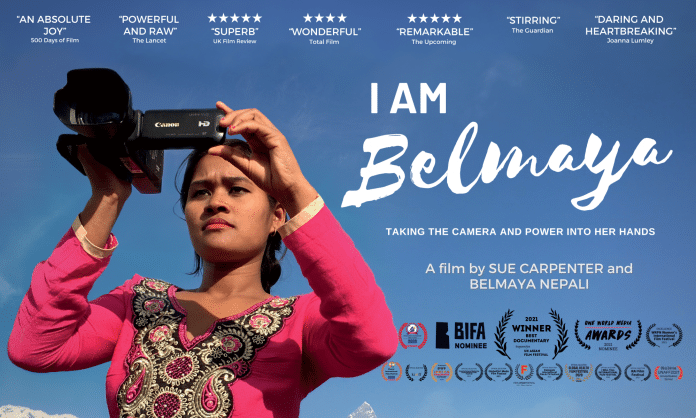During the 16 Days of Activism, Ciné-ONU in partnership with the British Embassy in Belgium screened ‘I am Belmaya’, a film about female empowerment, violence against women, and the importance of education for girls.
The film, directed by Sue Carpenter and Belmaya Nepali, is set in the patriarchal society of Nepal. It follows Belmaya Nepali, born into the lowest caste of society, on her journey to becoming a documentary filmmaker. Through telling her story, Belmaya grows in confidence. She stands up to her abusive husband, and power begins to shift from the camera, into her hands.
Following the screening, Sue Carpenter, Martin Shearman, Heidy Rombouts and Dagmar Schumacher participated in an interesting discussion on the film and the issues it raised.
On the Film
When asked about the success of the film, Sue Carpenter said that it comes down to Belmaya’s understanding of storytelling and her ability to connect with people. “She’s not a technical filmmaker, but an inspirational one”.
Martin Shearman, British Ambassador to Belgium, said the power of the film came from the universality of the topic. “Access to education and having control over your life are universal issues – and the film shows them so powerfully”.
“The film is about second chance education.” said Dagmar Schumacher, Head of UN Women Brussels Office, “Even if somebody didn’t have the chance to go to school, they still need the chance to have an opportunity in life”.
Sue Carpenter said that for Belmaya, a camera was her opportunity. “The process of picking up her camera and looking at the world through that lens, instead of looking at herself in the mirror, made her see her position in society in a different way. Just having that camera gave her a sense of power.”
In summing up, Caroline Petit, Office in Charge of UNRIC and moderator noted that, “Belmaya gives a voice to the voiceless”.
 Empowerment of Women
Empowerment of Women
Empowering women is essential to achieving gender equality. It gives agency and control to women who would otherwise be excluded from society.
According to the panel, empowerment comes from enabling women to be leaders, giving them opportunities, and allowing them control over their life.
“Leadership is important in empowering girls.” said Heidy Rombouts. “It enables women to be able to stand up for themselves and have their own revenue. It’s important to allow women, and young women, to put their future in their own hands”.
Opportunities are pivotal in the fight for gender equality. However, opportunities must be sustainable. “You can’t just swoop in, give the opportunity, and go away again.” said Ms. Carpenter. “Everybody needs support around them”.
“A huge part of empowering women is having control over your own body and having access to sexual reproductive health rights”, added Martin Shearman.
 Changing Societal Norms and Behaviour
Changing Societal Norms and Behaviour
While empowering women is an important step to ending violence against women, Martin Shearman explained that empowered or not, women still face violence every day.
“The whole issue of gender, is about societal norms.” elaborated Heidy Rombouts. “Fundamentally, it’s not just about the empowerment of individuals, it’s about changing the norms in society”.
Dagmar Schumacher agreed, emphasising that the societal shift must involve men, “We must address the stereotypes and toxic masculinity”.
Transforming what masculinity means, is the key to changing societal norms and behaviour around gender. Heidy Rombouts expressed the need for positive and transformative masculinity. One way to alter the gender narrative, according to Ms. Rombouts, is to provide young boys with inspiring male role models. By doing so, we can begin to combat toxic masculinity standards.
A Universal Issue
One in three women worldwide experience violence in their lifetime. “There’s a temptation to think that this is a problem in developing countries. The scale may be different, but violence against women is a problem in all countries,” said Martin Shearman.
“When we approach these issues and think about it, it’s really important to see it as a universal issue” he continued. “It may take different forms in different places, but it’s not ‘us’ talking about ‘them’. It’s about all of us taking this issue and doing better on it.”
“All of us can do something. Raise awareness and speak out when you see something that is not right.” concluded Dagmar Schumacher.



 Empowerment of Women
Empowerment of Women Changing Societal Norms and Behaviour
Changing Societal Norms and Behaviour